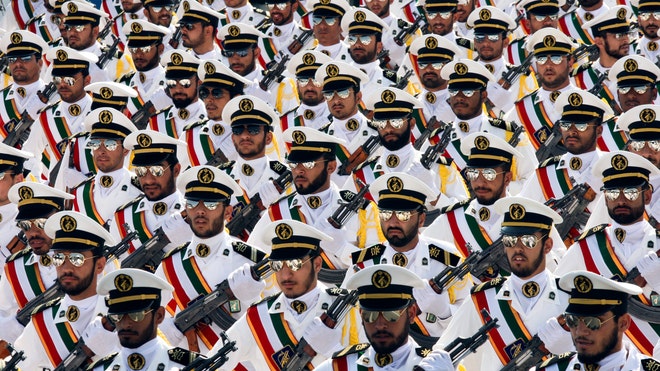Iranian general admits 'fighting every aspect of a war' in defending Syria's Assad
Iranian general admits 'fighting every aspect of a war' in defending Syria's Assad
Published August 28, 2012
FoxNews.com
Iran, in continuing to support the Syrian government’s crackdown against protesters, publicly stated that it is sending military personnel from its elite Iranian Revolutionary Guard Corps to Syria.
“Today, we are involved in fighting every aspect of a war, a military -- one in Syria, and a cultural one as well,” Gen. Salar Abnoush, a Revolutionary Guard commander, said to a group of volunteer trainees Monday, as reported by Daneshjoo News Agency, an online pro-regime student-run media platform.
Though many have pointed for quite some time to the symbiotic relationship between Tehran and Damascus, including Iran’s training of Syrian cyber police and sending tactical support and cash, the statement appears to be the Iranian regime’s first public account of military participation in Syria.
More than 23,000 Syrians, including many women and children, have been massacred in the more than 17 months of uprising against the Bashar al-Assad regime.
Public acknowledgment of Iran’s manpower support and military involvement in Syria comes at a time when international pressure against Syria is at its peak and the Syrian regime’s massacre against its civilians is most violent. Syrian military defections are on the rise, and many soldiers are often unwilling to fire at protesting crowds.
“Today, Syria is resisting as our front’s surrogate, and we all have a responsibility to support it and to not let the line fall,” Iran's semi-official Fars News Agency quoted Mullah Hussein Taeb as saying. Taeb is a well-known suppressor of the 2009 Iranian uprisings, as head of intelligence for the Revolutionary Guard, and right-hand man to Supreme Leader Ali Khamenei.
This month, Syrian rebels in Damascus captured 48 Iranians, who they believed were members of Iran’s Revolutionary Guard. The Iranian government replied that the 48, including some retired members of the Revolutionary Guard, were on pilgrimage visiting a Shiite shrine.
The acknowledgement Monday coincides with Iran hosting a six-day Non-Aligned Movement summit this week to oppose the sanctions and Western isolation that are aimed at punishing the Islamic Republic for its nuclear agenda.
Iranian officials hope to unify participants of the 120-nation summit, including new Egyptian President Mohammad Morsi, the first Egyptian leader to visit Iran since its 1979 Islamic Revolution, to stand behind the Iranian regime’s ongoing proliferation program.
A second item on the agenda will be a detailed game plan for Syria presented by the Iranian government.
Iran is still eager to host talks between Assad’s government and the opposition, according to Alaeddin Boroujerdi, chairman of the Iranian Parliament’s National Security and Foreign Policy Commission. Boroujerdi is currently in Syria and met with regime officials Sunday, according to the Iran's state-owned broadcasting service Press TV.
Many Iranians feel betrayed by their government helping Syria at a time when their own economy is in dire decline.
“The people of Iran are more upset about the financial help that the regime gives Syria, when our own people did not receive the proper help and rescue during the recent earthquake,” said Marjan, a former journalist living in Iran. “We don’t have enough hospital beds to care for all the victims, and then we hear the government is sending ambulances to Syria.”
Many social media groups and campaigns focus on the solidarity between the Iranian and Syrian people, both wanting to break free of dictatorships.
“The future of our country and the future of Iran’s government are two separate things,” writes one political blogger in Persian. “If this regime continues to do whatever it takes to keep Assad in power, not only must we live in famine, even our children will have to pay.”
Another Iranian activist writes to Fox News in an email: “The Iranian people are against aiding Assad’s government. The Iranian regime believes that if they keep Assad in power, it will strengthen their own reign at home. They are mistaken.”
In February, documents revealed that the Iranian government had given the Syrian regime more than $1 billion to help relieve pressures of an international oil embargo and other restrictive measures on travel and trade through its central bank. Currently, the U.S., Turkey, European Union and Arab League have imposed crippling sanctions on Syria’s trade, banking and oil exports in order to deter its massacring of citizens.
Labels: generaltopic

